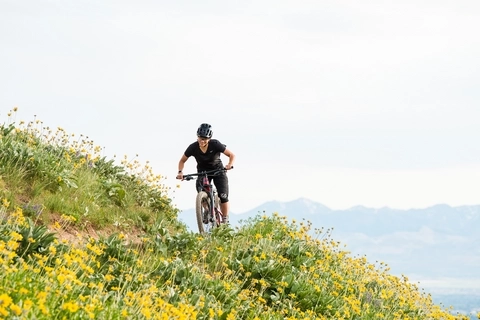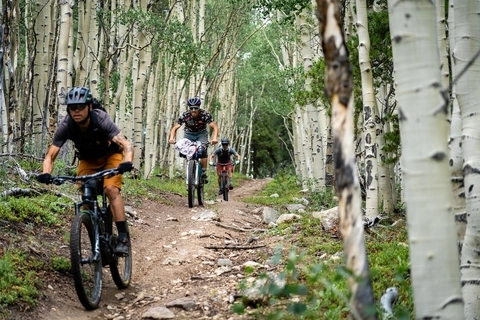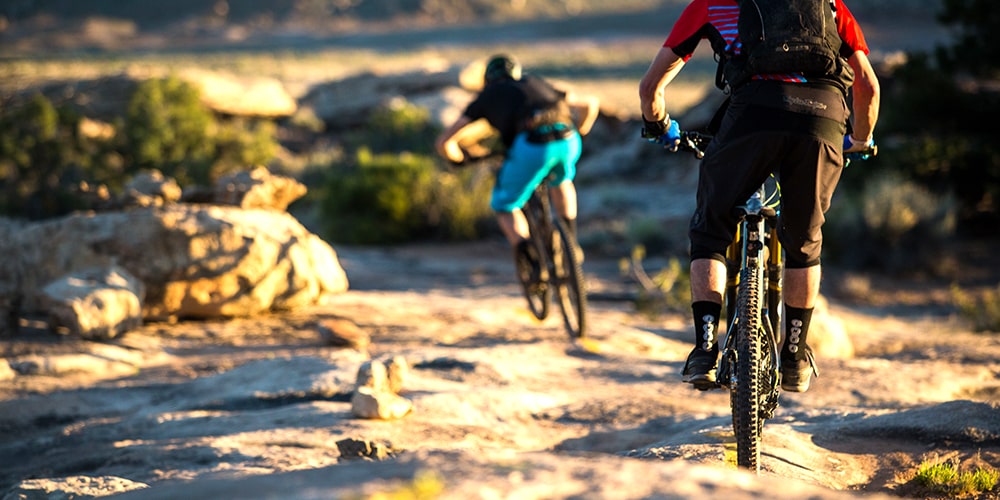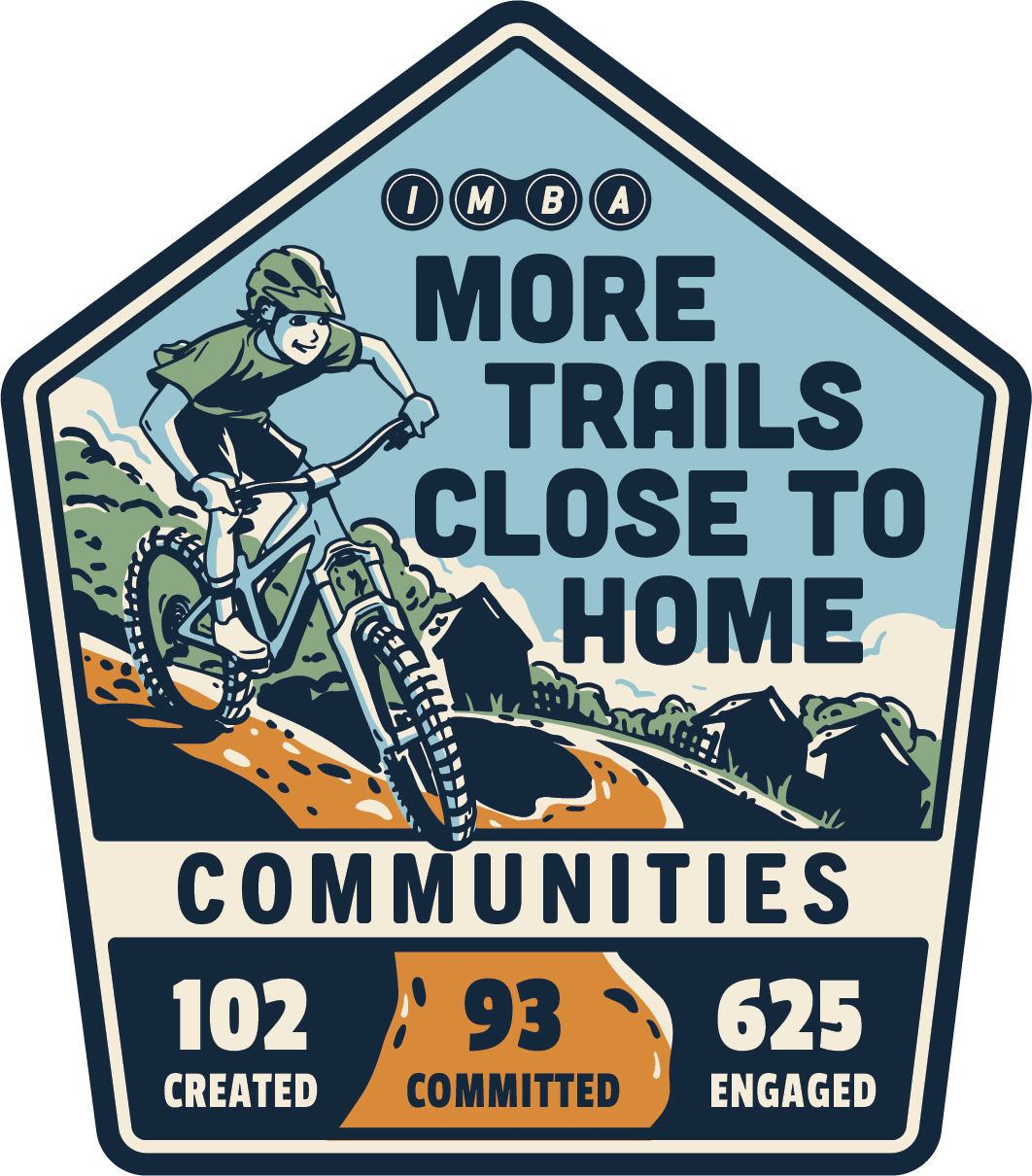Lifeline, Shoreline Film Advocates to Complete Utah’s Bonneville Shoreline Trail
Media contact: Eleanor Blick
IMBA Senior Communications & Advocacy Manager
(720) 900-4622
(Boulder, Colo., Nov. 5, 2020) — The International Mountain Bicycling Association (IMBA) has awarded its fourth round of Trail Accelerator grants to nine recipients in nine states, bringing the total to 25 awards nationwide since the grant program began. This round of grants will distribute more than $143,000 to community trail planning and design projects, which will become $286,000 with participant matching funds. Awards were given to projects in Page, Arizona; Farmington, New Mexico; Florence, Alabama; Ironwood, Michigan; Old Fort, North Carolina; Rochester, New York; Tahlequah, Oklahoma; and Chattanooga, Tennessee.
“This year, more than ever, we recognize more trails are necessary for trail users of all types to enjoy the outdoors comfortably and safely. Through the Trail Accelerator grant, IMBA is helping to bring much-needed trails close to home in communities across the country. We’re grateful for the support IMBA has received to increase our Trail Accelerator grant funding and look forward to working closely with these nine new projects,” said Dave Wiens, IMBA Executive Director. Nearly every project will benefit youth riding programs including NICA teams, and will increase access to the outdoors for underserved populations, which will lead to healthier, more prosperous communities with more life-long riders.
IMBA’s Trail Accelerator grant is a competitive grant offering for communities who need support to realize their vision of transformational trail systems. A professionally planned sustainable trail system can serve as a model and as inspiration for an entire mountain biking region. Awardees provide matching funds and receive professional trail planning and consultation services from IMBA Trail Solutions to launch trail development efforts, which can help leverage more interest and investment for community trail projects. Projects must show strong partnerships between local leaders, government entities, land managers, property owners, community groups, and IMBA Local partners. The next grant cycle will open in 2021, and IMBA welcomes communities to apply through our website.
Fall 2020 Trail Accelerator grant communities:
Page, Arizona — Page Regional Mountain Bike Park: $30,000 grant
The Page Regional Mountain Bike Park will support a bike park and connecting trails that follow a mesa rim in the spectacular landscape near Horseshoe Bend, Antelope Canyon, and the city of Page. The site is located within two miles of the local high school, the city sports complex, and the Navajo Nation town of Lechee, providing easy access to outdoor recreation for youth and other community members. The city is working with Arizona State Parks to create the park, trails, and functional facilities such as parking lots, trailheads, and restrooms.
Farmington, New Mexico — Neck Nature Park and Bike Trails: $30,000 grant
The city of Farmington aims to create sustainable bike trails on a parcel of over 80 acres. The land was gifted to the city by a family trust with the hope of creating a natural landscape close to home that all residents can enjoy. The vision is to connect the bike trails on the project site to existing bike trails in the city, bordering Bureau of Land Management acreage, and the Farmington Lake recreation area, creating a far-reaching system. Located just north of Farmington schools and San Juan College, which provides low-cost bike rentals, the trails will offer opportunities for youth, newcomers to biking, and experts alike to get out on the trails. With New Mexico launching an Outdoor Equity Fund, these trails could help improve trail access for local youth to ride and get outdoors.
Florence, Alabama — Muscle Shoals National Heritage Area: $10,000 grant
The Muscle Shoals National Heritage Area (MSNHA), the city of Florence, and the Shoals Mountain Biking Club are working together to improve existing trails and create additional trails in a 200-acre city park near the University of North Alabama and downtown Florence. By repurposing some trails that are too technical or difficult into mountain bike-specific trails for all levels, the project will provide a direct opportunity for families and beginners to enjoy the trails and for local NICA teams to practice. Currently, mountain bikers have only limited options for trails within a reasonable driving radius from Florence. Building equity into the park is a primary goal for this project, making access more practical for those who cannot travel long distances to mountain bike and for historically underserved communities.
Ironwood, Michigan — Mt. Zion Park Mountain Bike Trail System Plan: $11,000 grant
The Gogebic Range Health Foundation, whose mission is to create a more healthy and active community in the Gogebic region, is partnering with the SISU Dirt Crew and other local organizations to bring bike trails to Mt. Zion Park. Six additional miles will bolster a well-used, half-mile trail that gets tons of traffic because of its unique location and proximity to the city. Located on the Gogebic Community College campus, Mt. Zion Park will lead students and citizens to trails right out their back doors and connect to the Iron Belle Regional Trail System. Downhill and cross-country trails of all difficulty levels will cater to a wide range of cyclists and enhance rider skill development. The Mt. Zion bike trails will be utilized by the Adventure Bike Club and high school bike teams for training and practice.
Old Fort, North Carolina — Camp Grier G5 Trail Collective: $15,000 grant
While the town of Old Fort and neighboring Camp Grier can boast of a couple advanced-level bike trails, the Camp Grier G5 project will diversify trail offerings by bringing intermediate and beginner level tracks to the region for campers, NICA racers, and locals. Camp Grier has a long history of promoting diversity and inclusion in the outdoors, offering scholarships to 20% of its campers to increase the racial, social, and economic diversity of their camper population. The new trail system will cultivate a population of younger riders in the region and point to a future where outdoor recreation can support thriving economies in small rural towns.
Rochester, New York — West Hill Trail Network: $10,000 grant
The Nature Conservancy of the New York area is collaborating with the Genesee Regional Off-road Cyclists, the IMBA Local Chapter; and Crankskins, a local cycling club, to create a network of shared-use trails optimized for sustainability and mountain biking within the Finger Lakes region. The Nature Conservancy envisions the West Hill project as a model for creating sustainable trails and expanding nature access to more user groups while protecting precious lands and waters. The Crankskins club plans a series of junior development opportunities on the site, including youth clinics and USA Cycling, North American Cycle Sport, and NICA training and racing.
Tahlequah, Oklahoma — Tahlequah Trails Master Plan: $7,500 grant
The Tahlequah Trails Association has gathered an extensive group of partners to support their trails project, which will utilize a beautiful, wooded, 200-acre site along the Illinois River to build trails from beginner to expert within a 10-minute drive of Tahlequah. The Cherokee Nation, the Tahlequah schools bike club, the city of Tahlequah, Cherokee County, and the local Paceline Cyclery are among the partners cooperating to bring trails to a county where, currently, no designated mountain bike trails exist. The establishment of a trail system will create a venue for riders from area schools, promote health and wellness for residents, and enhance tourism by drawing visitors from nearby destinations such as Lake Tenkiller, the Cherokee Nation tribal headquarters, and the historical Trail of Tears.
Forest Grove, Oregon — Wilson River Trail Segment D: $15,000 grant
Segment D of the Wilson River trail will link together two trails in the Tillamook State Forest, creating a complete 78-mile multi-use trail near the Portland metro area. The addition of this trail segment expands trail opportunities close to an urban center and coastal towns, improves trail system diversity, and creates opportunity to disperse users in an increasingly busy outdoor space. In support of welcoming historically underserved communities, the Oregon Department of Forestry focuses on economic development of rural and urban areas that will ensure equal access to the outdoors and increase outdoor participation, especially among youth and disadvantaged populations.
Chattanooga, Tennessee — Aetna Mountain Trail System: $15,000
The Tennessee River Gorge Trust will add 15-plus miles of high-quality singletrack mountain bike trails to the Aetna Mountain area, responding to increased demand for bike trails and rounding out the recreational offerings of hiking, climbing, caving, and river activities in the region. The Trust protects undeveloped lands within the Tennessee River Gorge while also providing recreational access for the community. For a trail system, that translates to sustainably built and managed trails that maintain surrounding ecological health. The trust also intends to lead a very intentional effort to engage nearby community members in the trail planning process, especially those who lack immediate access to outdoor recreation, so that residents will connect with the project and trail users will better represent Chattanooga's diverse community.
About IMBA:
The International Mountain Bicycling Association (IMBA) creates, enhances, and protects great places to ride mountain bikes. It is focused on creating more trails close to home to grow the quantity and quality of mountain bike trail communities across the U.S., so everyone has access to close-to-home rides and iconic backcountry experiences. Since 1988, IMBA has been the worldwide leader in mountain bike advocacy and the only organization focused entirely on trails and access for all types of mountain bikers in all parts of the U.S. IMBA teaches and encourages low-impact riding, grassroots advocacy, sustainable trail design, innovative land management practices, and cooperation among trail user groups. IMBA U.S. is a national network of local groups, individual riders, and passionate volunteers working together for the benefit of the entire community.







